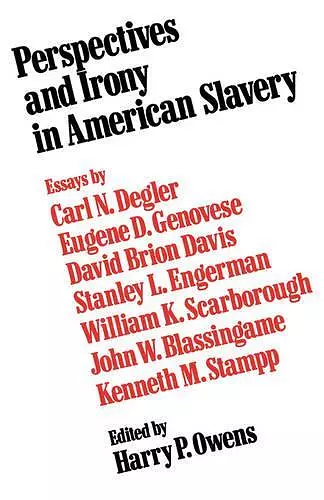Perspectives and Irony in American Slavery
Format:Paperback
Publisher:University Press of Mississippi
Published:30th Oct '08
Currently unavailable, and unfortunately no date known when it will be back

Perspectives and Irony in American Slavery Edited by Harry P. Owens Essays by Carl N. Degler, Eugene D. Genovese, David Brion Davis, Stanley L. Engerman, William K. Scarborough, John W. Blassingame, and Kenneth M. Stampp This volume is an outgrowth of a symposium entitled "The Slave Experience in America: A Bicentennial Perspective," sponsored by the University of Mississippi in October, 1975. Few institutions have had as much influence on American history as the institution of slavery. For at least three centuries slavery has generated discussion, heated debate, or active denunciation. In this volume of collected essays, seven distinguished historians offer, not consensus, but their individual perspectives on this controversial subject. In his essay, Carl N. Degler develops the idea of irony in American slavery, one of the major themes of this book. Examining slavery in its international setting, Eugene D. Genovese interprets the relationships between emerging capitalism and slavery and the conflicts between the industrial revolution and the old landed classes.David Brion Davis concentrates on American attitudes toward slavery by viewing the abolitionists' arguments against slavery as being shaped, in part, by the southern defense of slavery. Both sides of this conflict, according to Davis, ironically failed to develop along the central force of slavery. Stanley L. Engerman discusses the economies of slavery and the nature of the slave economy. In presenting slavery through the eyes of the slave holder, William K. Scarborough concentrates on the large plantations and offers a perspective on the paternalistic nature of slavery. John W. Blassingame examines slavery, not from the planter's house, but from the slave quarters and offers insights into the complex relationships and status symbols within the slave community. In the concluding essay, Kenneth M. Stampp presents his interpretation of the role of historians and their continuing investigation of American slavery.
ISBN: 9781604731774
Dimensions: unknown
Weight: 333g
188 pages